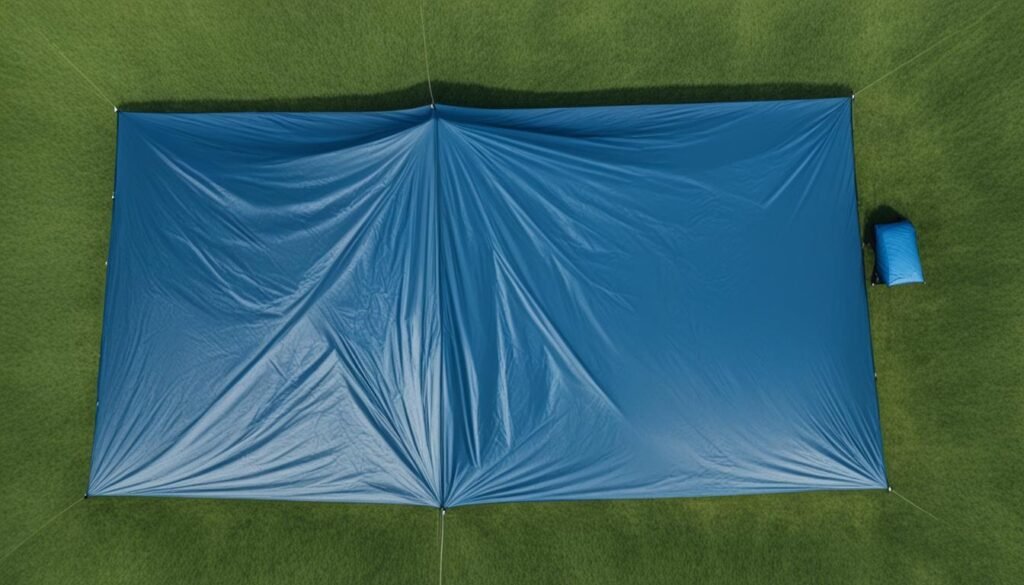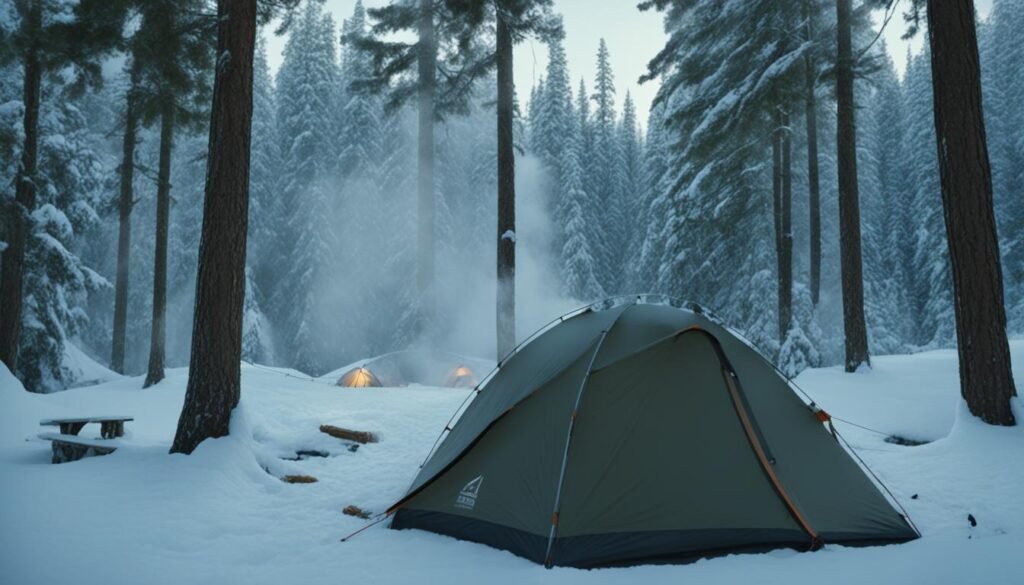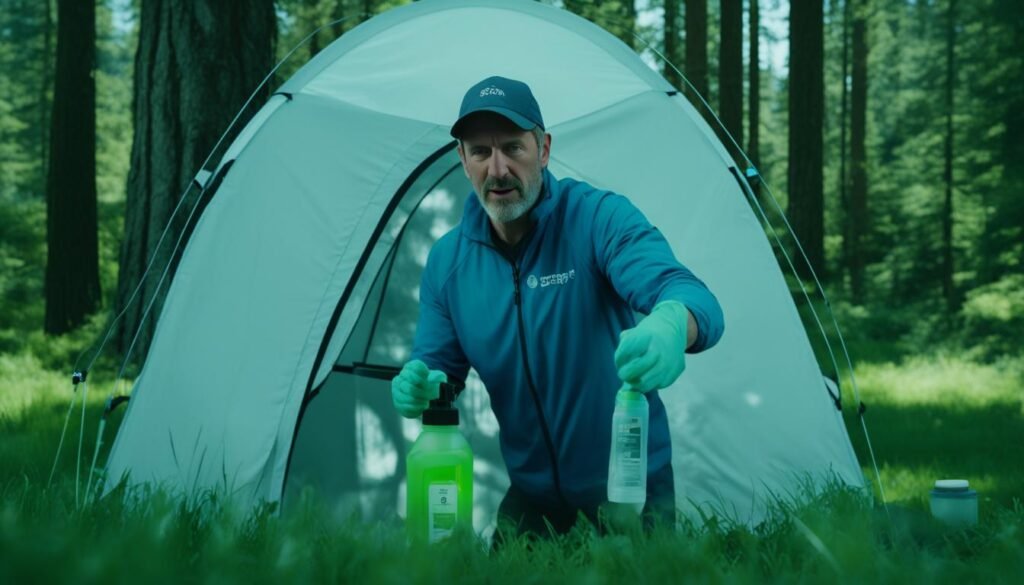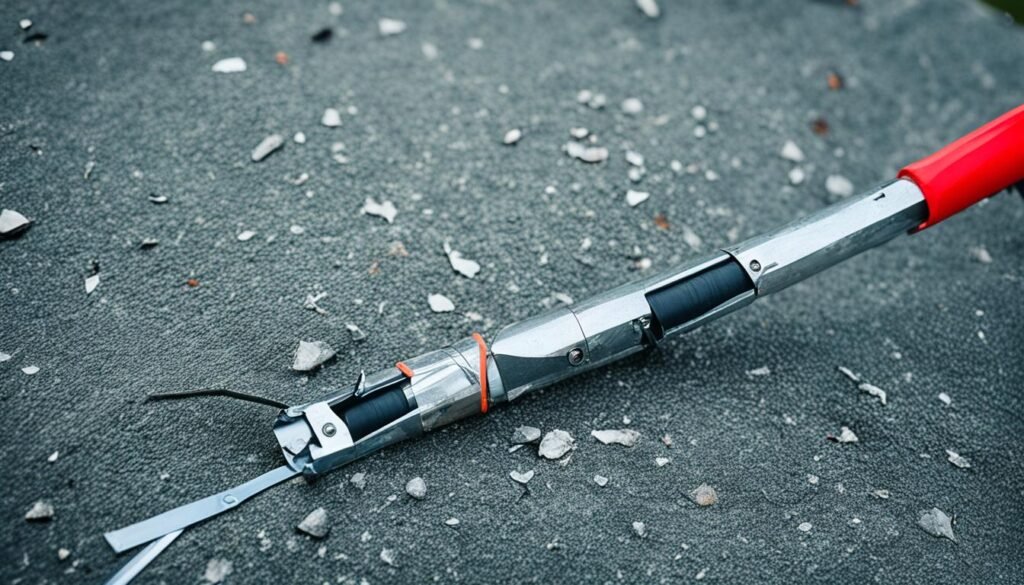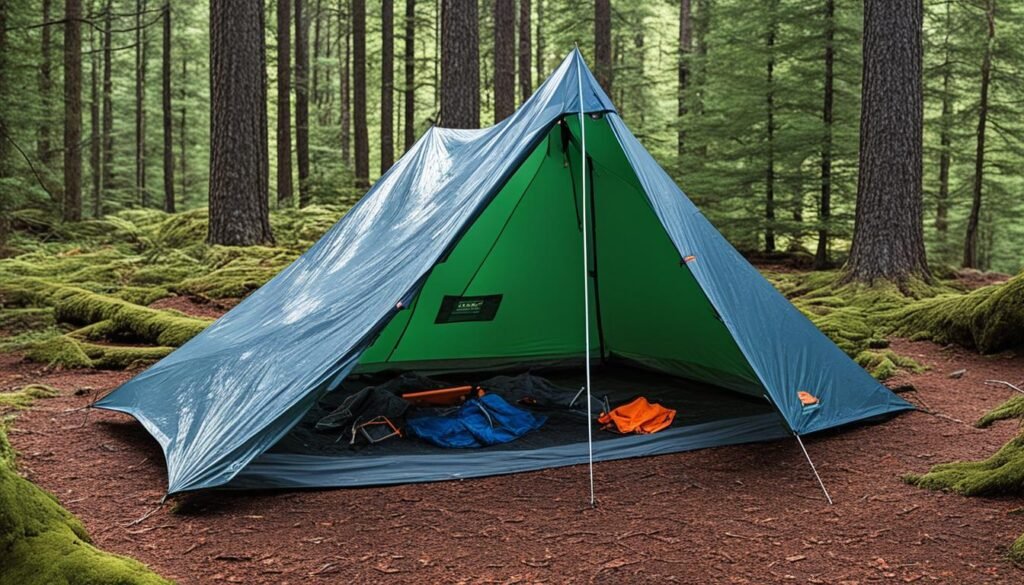Nighttime starts at campsites are sometimes needed. Using expert advice can make a big change in how your night camping goes. Kelly Beasley from CampAddict.com says focus on the main things like setting up the tent and taking care of basic needs.
Good lighting is key for night camping. Beasley recommends using portable lights that detect motion. Also, Grant Sinclair of Our Wander-Filled Life likes headlamps. They let you work with your hands free, making setting up your tent at night easier.
Dividing tasks makes things go faster. Eric Yu, a travel blogger, says to give each person a job. This helps you set up your campsite quickly and with order. Don’t forget about the kids. Sharee Collier from LiveCampWork.com says to keep them safe in the car while you set up to avoid accidents.
Choosing the right kind of light is important too. Becky Moore from Global Grasshopper prefers red lights. They keep your night vision clear and attract fewer insects. No matter if you’re a seasoned camper or it’s your first time setting up at night, following these ideas can make the process smoother.
Understand the Campground Rules
It’s key to follow campground policies when arriving late at your RV site. Most places shut their gates at 10 p.m. and open again at 6 a.m. This matches the usual RV park quiet hours. Make sure to get any gate codes needed and keep emergency contacts ready.
Knowing the campground rules and procedures helps keep things calm. Since phone service might be weak, grab a map before you lose signal. Some camp spots are hard to find at night, with dark streets or strict one-way paths, making driving tough.
Try parking your RV in the daytime to get the hang of it before dark. Use red lights to see better without ruining your night vision. Park in areas just for RVs to not bother tent campers. And put your food in a bear box or in your RV to stay safe from wild animals.
Be quiet at night by turning off lights, talking softly, and avoiding loud sounds. This helps everyone enjoy their time there and shows you’re a good camper.
Prepare Your Gear in Advance
Proper planning can help you set up camp easier even in the dark. Always pack a camping checklist to not forget important items. Chris Emery suggests putting key items on top for quick access. This method is especially helpful when needing to *set up camp in the dark* quickly.
Organizing your *camping gear* well is critical. Keep things like tents, sleeping bags, and headlamps easy to reach. This is vital, especially in places like deserts with unseen dangers. Practicing setup in the light can make night setups smooth and fast.
Also, have a clear plan for where you’ll park and place your camp. This knowledge can prevent extra movement and noise if you arrive late. A detailed setup plan makes a late-night arrival much easier.
Use Proper Lighting
Grant Sinclair talks about how important a good headlamp is. It keeps your hands free in the dark. This makes setting up camp much easier. Camping lighting solutions are key, especially at night.
Sinclair suggests using LED headlamps for camping. They are bright and let you work hands-free. He says a headlamp with a red light mode is a must. Eric Yu mentions that using red light in camping helps keep your night vision sharp and deters bugs.
For a wide area of light, try portable flood lights with motion detectors. They can be attached with Velcro and are perfect for dark paths. Camping lights come in many types to meet your needs:
- Railroad Lantern: Lasts 3.5 hours on high or 100+ hours on low.
- Multi-Colored Globe Light: Features 9 different dimmable colors.
- Edison String Lights: Available in 4 colors.
- Beacon Hanging Light: Available in 8 colors.
- Outpost Lantern: Available in 2 colors.
Some RVs let you dim exterior lights. This helps in Dark Sky Parks where you should use as little light as possible. Copper Breaks State Park has amazing Bortle 2 skies. Using red lights there helps protect wildlife and keeps the sky clear.
Using a mix of camping lighting solutions creates good, not too bright, light. This makes your camping experience better and respects nature’s dark beauty.
How to Set Up a Tent in the Dark: Tips for Night Arrivals
Setting up a tent in the dark can be tough, especially if it’s your first time. Being ready and using smart strategies for setting up camp at night are key.
Start by getting to know your tent pitching instructions. Whether it’s a canvas, polyester, pop-up, or pole tent, understanding how it goes together is important. Setting it up at home will make things easier when you get to the campsite.
Give each person in your group a job to do. Working together can make setting up faster and less stressful. For example:
- One person can unpack the tent parts.
- Another can start putting up the poles or the pop-up part.
- And a third can light the area with a flashlight or headlamp.
When you get to the campsite late, check out the best spot for your tent. Find a flat area that’s shielded from the wind and close to things like restrooms and water. This makes your camp setup in low light easier.
Good lighting is also key. Make sure to have enough flashlights, headlamps, or lanterns. Place them well to light up where you’re pitching your tent, but avoid a glowing light that can hurt your eyes.
It’s good to know some night arrival camping strategies. Getting there an hour before sunset lets you use the last light for setting up. This extra time is really helpful for a smooth start to your night.
With these tips and a good plan for camp setup in low light, you can set your tent up easily even when it’s dark.
Arrive with a Plan
Planning your camping arrival strategy in advance makes everything easier. Especially at night when you’re parking your RV. Know the campsite layout beforehand. Download or print maps since phone signals could be weak. This way, navigating dark roads will be a breeze.

Make a clear plan for where to put your RV or tent. Find landmarks and good parking spots early. This will help a lot at night, making it all much simpler and less stressful. Also, tell a trusted person where you’ll be camping for safety.
Pack smart to save space. Put heavy items under everything else to avoid damage. Clothing can go in compression bags. Consider a roof box for more room if needed. This saves time and frustration when setting up.
Practice putting up your tent before you go. Doing this at home is smart. It helps you set up quickly, even when it’s dark. Getting there early afternoon lets you get settled before it gets too dark. Good planning and setting things up well are key to a relaxing start to your trip.
Keep Noise to a Minimum
Making sure campgrounds stay peaceful is key for a great camping trip. Using good ways to control noise helps keep the natural setting calm for all visitors. Follow these tips for courteous camping practices:
- Turn off headlights promptly upon arrival to avoid disturbing others.
- Engage in quiet conversations; speak softly and be mindful of noise levels.
- Avoid using loud activities and tools, especially power tools.
- Minimize the use of exterior RV lights to reduce light pollution.
By using these ideas, campers show they care for nature and others around them. Being quiet is not just polite, it makes camping better for everyone.
Keep Kids Safe and Happy
Keeping children safe at camp is very important for a great time when it’s dark. Expert Sharee Collier suggests kids stay in the car until the site is fully prepared. This helps keep kids safe and away from danger in the dark.
Getting ready for bedtime at the campsite before you get there can help a lot. Dressing kids in their pajamas early can make things smoother once the tent is set up.
- Prepare kids for bed in the car by putting them in pajamas.
- Bring comfort items from home to help them feel secure in the new environment.
- Assign a designated adult to supervise children during the setup process.
Lighting is key for nighttime camping with kids. Make sure the site is well lit, using headlamps, flashlights, and lanterns. This will help everyone see clearly and stay safe.
These tips will greatly improve your camping trip’s safety and fun. By focusing on camping safety for kids and keeping kids safe at camp, you create a happy and secure family space under the stars.
Stay Organized
It’s key to keep things neat at a campsite, especially when you get there late. A tidy setup avoids mess and makes everything easy to find. This brings more joy and less worry to your trip. Use smart camping organization tips for a better adventure.
Put your gear in order by what you need first. This makes the important stuff easy to get to. A smart efficient camp setup starts with the sleeping spot. Then, it’s time for the kitchen and storage areas.
Use a 3-tier storage container to keep things in their place. This way, you always know where your camping gear is.
- Keep items like pillows, blankets, and sleeping bags close by.
- Put lights like lanterns all together for when it gets dark.
- The Luno car window screens and magnetic shades really help with camping gear arrangement. They keep your stuff private and let in air.
In a car, window covers are a must. The Luno car window screens are simple to use and store. They let you open the windows a bit for fresh air without worry. Accessories like the Luno Privacy Curtain also add to your comfort at night.
Good sleeping gear is a must-have. Things like the Luno Air Mattress are cozy and easy to use. If you have less room, foam pads are a good choice too.
Setting up camp safely is really important. Pick a sleeping spot while it’s still light out. Make sure you’re near help if you need it. Check the rules about where you can and can’t camp. A solid camping gear arrangement plan will make your trip smoother and more enjoyable.
Avoid Distractions
Setting up a campsite with focus is key, especially at night. Planning and acting straightforward help a lot. This makes your setup faster and smoother.
- Make a task list: Before you get to the campground, write down what you need to do for your tent. This makes sure everyone helps and things get done quickly.
- Stick to the important stuff: Put up your tent, arrange where people will sleep, and set up your cooking area first. Save the fun stuff for later when it’s light out.
- Keep things quiet: Try not to make too much noise. This way, you won’t bother other people trying to enjoy their time outdoors.
Focusing makes setting up easier and more fun. Remember to bring important things like the Snake and Spider Bite Kit from Rescue Swag for safety. This way, you’re ready for everything.
Practice Good Camping Etiquette
Be sure to follow good camping manners for a nice time. This includes being careful with light and sound at your camp. Choosing red lights can help keep peace at night.
Always keep quiet during the night, from 10 p.m. to 8 a.m., so others can sleep. Campgrounds have rules about noise to avoid problems. Arrive early to set up your camp and not disturb at night.
Driving slowly inside the camp keeps everyone safe. This is part of showing respect. And remember to leash your pets outside to keep peace with other campers.
In places like Malaysia, it’s vital to obey all rules. Use fire pits and protect the nature around you. Bring enough supplies for the weather to not only keep yourself safe but also respect the environment.
Keep quiet and use soft light to enjoy nature fully. Your good behavior benefits all campers and the surroundings. So, always aim to make camping better for everyone with your actions.
Stay Calm and Safe
Camping after dark has its own set of challenges. It’s key to stay focused on safety while keeping calm. A relaxed camp setup improves the entire camping trip.
- Wear Suitable Clothing: Merino wool 150g t-shirts help keep you cool at night. They are great for their breathability.
- Stay Hydrated: To avoid heatstroke, keep water handy and stay away from hard work.
- Manage Tent Temperature: A cool tent equals better sleep. Use tarps and fans to keep the air fresh.
- Proper Food Storage: It’s important to keep food cold. Coolers in the shade do the trick.
- Plan Ahead: Set up your tent before night falls. Know your gear to stay calm under the stars.
Good planning and preparation are your best friends to avoid stress. These safety tips make your camping better and keep you cool and safe.
Be Aware of Your Surroundings
Being very aware of where you are is key when you get to a campsite at night. Knowing everything around you helps you move safely, even when it’s dark. Find out about the campsite, and watch out for things that might make you trip, like roots or rocks. Red light can help you see without losing your night vision too much.
Camping alone is a great way to get close to nature and work on your camping skills. Having a pet with you makes it more fun and safe. Start at a place you know well, not far from home. This helps you relax and get used to camping alone.
Keeping safe by having a first aid kit, telling someone where you will be, and making sure others can see you is very important. Try out your gear before you leave to make sure it works right. This can help you avoid problems on your trip.
- Identify and mark potential tripping hazards.
- Utilize soft, red lighting for better visibility.
- Stay connected with the outside world for safety.
- Notify someone of your camping location.
- Carry a basic first aid kit.
Camping on your own means you have to figure things out and be ready for surprises. It’s important to pack only what you really need. This keeps you from carrying too much weight. Whether you’re on your own or with friends, knowing about your camping spot and staying aware makes the experience better.
Utilize Motion Detections lights
Motion detection lights are great for moving around and setting up campsites at night. They turn on when they sense movement. This means you don’t have to keep turning them on and off. A top choice is camping motion sensor lights. They are reliable and save energy by only turning on when needed.
For camping, outdoor flood lights are very useful. They provide a lot of bright light over a wide area. This is key for setting up safely at night. Pairing them with motion sensors helps save battery and avoids bothering wildlife.
The right lighting can really improve your camping trip. Many people like LED camping lights because they are bright, last a long time, and save energy. You can also go for solar or rechargeable lights. These are good for the environment and keep working all night.
Using lights with motion detectors makes camping easier and safer. Whether it’s a small, focused beam or outdoor flood lights for camping, they add a lot. They make your nighttime adventures smooth and fun.
Minimize Setup Activities
Arriving at your campsite late, focus on crucial camping setups. By doing only what’s needed, campsite setting goes fast. This way, you’ll get your tent up quickly and not bother others with noise.
- Tent Setup: Put up your tent first, using the stakes and lines. Make sure it’s steady by using the J-hooks and T-stakes correctly. If the ground is dry, you can watch videos at 4:22 and 4:30 to see how to stake your tent securely like they did at Oshkosh in 2021.
- Immediate Necessities: Keep important things close like sleeping bags, lights, and medicines. It makes setting up your space easier.
- Delay Non-Essential Tasks: Save unpacking chairs or setting up grills for daylight. This saves energy and keeps the peace for other campers.
Following this plan, your tent goes up fast. You stay ready without bothering others. Know what to set up first, and keep important stuff handy. This makes getting to any campsite smooth, be it Oshkosh or Sun ‘n Fun (SNF).
Plan Night Activities Post Setup
After setting up your campsite, it’s time to relax and have fun at night. Planned nightly activities can make your camping trip even better. You can go on a thrilling night hike or enjoy quiet stargazing.
Night hikes are great for exploring and feeling the calm of the woods. Consider geocaching—a cool treasure hunt for campers. Stargazing and taking photos of stars also let you see nature in a special way. This can be fun and educational.
At the campfire, telling stories or playing with glow toys makes memories. Since up to eight people can stay at a campsite in California State Parks, all can join in. Remember, be quiet after 10 p.m. to respect others. Doing things like telling stories or looking at stars together can really make your trip amazing.


